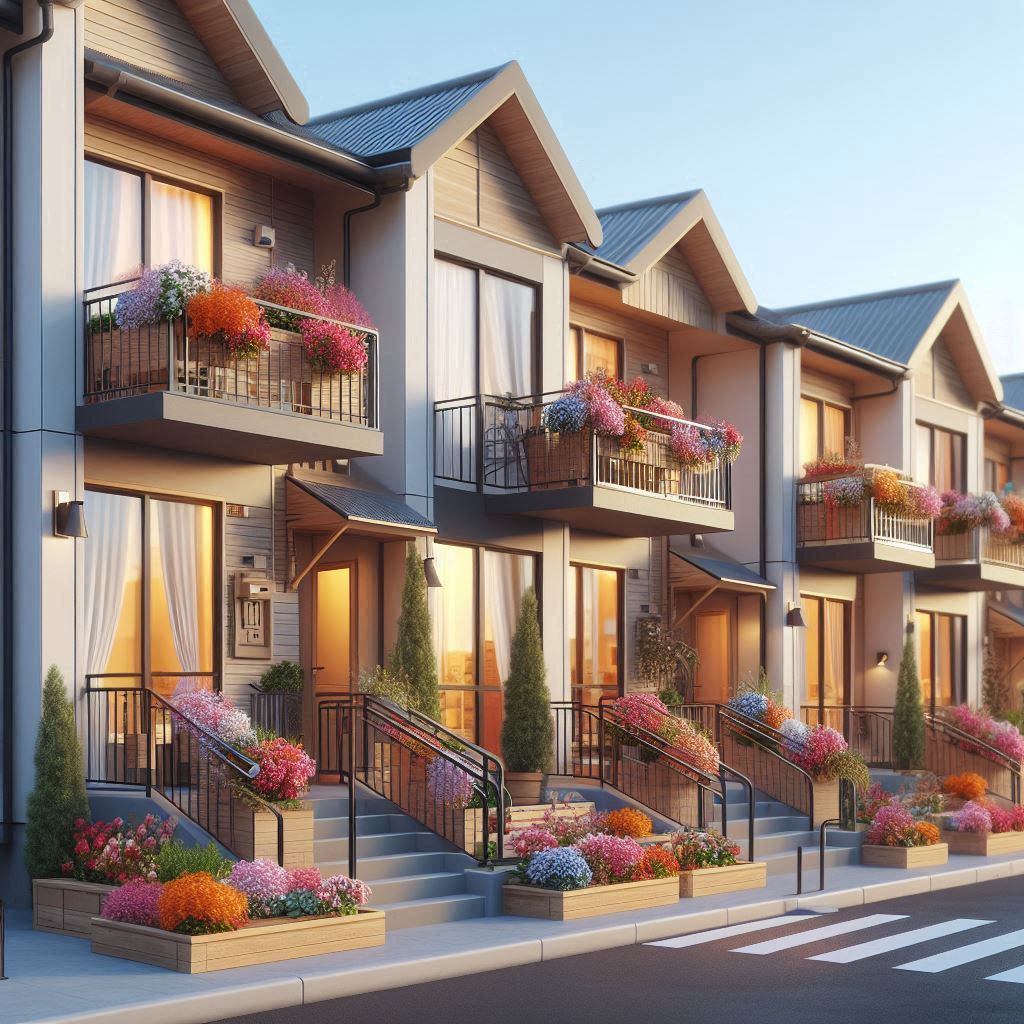
As people age, their living arrangements often need to adapt to changing physical and social needs. One popular option for seniors is living in an apartment complex. This choice offers a unique blend of independence, community, and convenience. In this post, I will explore what it’s like for seniors to live in an apartment complex, including the pros and cons, the types of activities that may be available, and whether or not it makes financial sense.
Pros of Living in an Apartment Complex for Seniors
1. Convenience and Accessibility
Apartment complexes often prioritize convenience and accessibility, making them an attractive option for seniors. Many complexes feature elevators, single-level living spaces, and accessible bathrooms, all designed to accommodate individuals with mobility issues. Additionally, having maintenance services on-site means seniors don’t have to worry about the physical demands of home repairs or yard work.
2. Safety and Security
Many apartment complexes offer enhanced security features such as gated entrances, security cameras, and 24-hour security personnel. This can provide seniors with peace of mind, knowing they are in a safe environment. Emergency call systems and staff available to assist in case of an emergency can also be reassuring for both residents and their families.
3. Community and Social Interaction
Living in an apartment complex can provide seniors with ample opportunities for social interaction. Common areas, such as lounges, gardens, and pools, encourage residents to mingle and build friendships. This social interaction can significantly reduce feelings of isolation and loneliness, which are common issues among seniors living alone.
4. Amenities and Services
Many apartment complexes offer a range of amenities and services designed to make life more enjoyable and less stressful. These can include fitness centers, swimming pools, libraries, and organized activities such as yoga classes, arts and crafts, and movie nights. On-site services like laundry facilities and garbage pick-up are also sometimes offered.
5. Reduced Responsibilities
Seniors living in apartment complexes often enjoy a lifestyle with fewer responsibilities compared to homeownership. There is no need to worry about property taxes, home maintenance, or landscaping. This allows seniors to focus more on enjoying their retirement and less on the burdens of maintaining a home.
Cons of Living in an Apartment Complex for Seniors
1. Cost
One of the potential downsides of living in an apartment complex is the cost. Monthly rent, combined with fees for amenities and services, can be expensive. For seniors on a fixed income, this can be a significant consideration. It’s important to carefully evaluate whether the benefits of apartment living justify the costs. The other issue is sometimes a complex will offer a great “move-in” rate but when your lease comes due for renewal they will jack it up to compensate for that great deal you got when you moved in.
2. Lack of Personal Space
Apartment living often means less space compared to a single-family home. Seniors who are used to larger living areas may find it challenging to downsize their belongings and adjust to a smaller space. The lack of a private outdoor area, such as a backyard, might also be a drawback for those who enjoy gardening or spending time outdoors. Where I live in Florida, it seems like they are cutting the square footage of each apartment (compared to some of the older units) on the new complexes that are being built
3. Less Control Over Environment
In an apartment complex, residents have less control over their environment compared to owning a home. Noise from neighbors, restrictions on pets, and limitations on personalizing the living space can be frustrating for some seniors especially if you are in a first-floor unit and the apartment above you houses a family with small kids or a barking dog. Additionally, rules and regulations set by the management can sometimes feel restrictive.
4. Potential for Social Overload
While social interaction is a significant benefit, it can also be overwhelming for some seniors. Those who prefer solitude or are introverted may find the constant presence of neighbors and organized social activities to be too much. This is easily handled by just staying home and relaxing. Remember, no one is forcing you to attend social events.
Added Benefits Of A Senior Apartment Complex
One of the highlights of living in a 55 and older apartment complex is the variety of activities available. These activities are designed to promote physical, mental, and emotional well-being.
1. Fitness and Wellness Programs
Many complexes offer fitness classes tailored to seniors, such as yoga, tai chi, and water aerobics. These programs help residents stay active and healthy. Some complexes may also have on-site wellness centers or partnerships with local health providers to offer services like physical therapy and health screenings.
2. Social Events
Social events are a staple in senior apartment complexes. Common activities include game nights, movie screenings, book clubs, and holiday parties. These events foster a sense of community and provide opportunities for residents to build friendships and stay engaged.
3. Educational and Cultural Activities
To keep the mind sharp, many complexes offer educational and cultural activities. This might include guest speakers, continuing education classes, arts and crafts workshops, and trips to local museums and theaters. These activities help seniors continue learning and exploring new interests.
4. Hobbies and Clubs
Many seniors have hobbies they enjoy, and apartment complexes often cater to these interests. Gardening clubs, knitting circles, and woodworking shops are just a few examples. These groups allow residents to pursue their passions and share their skills with others.
5. Volunteer Opportunities
Volunteering can be a rewarding way for seniors to give back to the community. Many apartment complexes coordinate volunteer opportunities, such as mentoring local students, organizing charity drives, or participating in community clean-up projects. These activities provide a sense of purpose and fulfillment.
Financial Considerations
Deciding whether living in a senior apartment complex makes financial sense depends on various factors, including income, savings, and the level of care and amenities required.
1. Cost Comparison
It’s essential to compare the costs of living in an apartment complex to other options, such as staying in a private home or moving to a retirement community. Factors to consider include monthly rent, utility costs, maintenance fees, and additional services. For some seniors, the convenience and amenities of apartment living may justify the higher costs.
2. Budgeting
Seniors should create a detailed budget to understand their financial situation better. This includes considering fixed incomes, such as Social Security and pensions, as well as any savings or investments. It’s crucial to ensure that monthly expenses, including rent and any additional fees, are sustainable in the long term.
3. Long-Term Affordability
When evaluating apartment living, seniors should also consider long-term affordability. This includes potential rent increases and the availability of financial assistance programs. Some apartment complexes offer subsidized housing or accept housing vouchers, which can make living there more affordable.
4. Value of Services and Amenities
The value of the services and amenities provided by the apartment complex should be factored into the decision. For example, if the complex offers comprehensive health and wellness programs, transportation services, and meal plans, these benefits can offset some costs that seniors would otherwise incur independently.
5. Equity Considerations
For seniors who own their homes, selling the property can free up significant equity. This equity can be used to cover the costs of apartment living or be invested to generate additional income. However, the decision to sell a home should be carefully considered, taking into account emotional attachments and potential market fluctuations.
Final Thoughts
Living in an apartment complex offers a unique lifestyle for seniors, combining convenience, community, and a range of amenities designed to enhance quality of life. While there are some potential downsides, such as cost and less personal space, the benefits of reduced responsibilities, increased social opportunities, and access to various activities often outweigh the cons. Financial considerations play a crucial role in the decision-making process, and seniors should carefully evaluate their budgets and long-term affordability.
Ultimately, the choice to live in a senior apartment complex depends on individual preferences, needs, and financial situations. By weighing the pros and cons and considering the available activities and services, seniors can make an informed decision that best suits their lifestyle and enhances their retirement years.
Did you enjoy this post? Do you want to know when the next post comes out? Consider subscribing. I only send update emails once a week, usually on Friday. Try it out. You can unsubscribe at any time.
